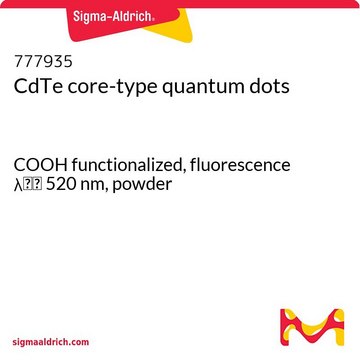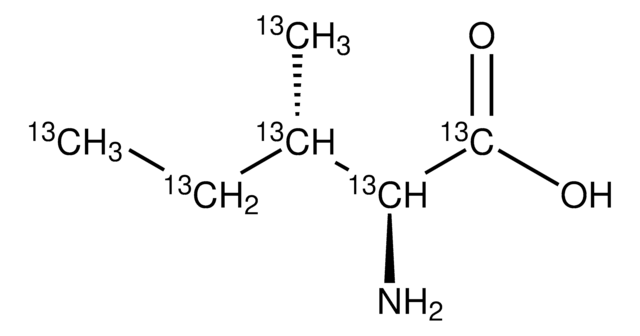推荐产品
品質等級
化驗
≥98% (HPLC)
形狀
solid
螢光
λex 333 nm; λem 515 nm±5 nm in DMSO
適合性
suitable for fluorescence
儲存溫度
2-8°C
一般說明
This fluorescent labeled catecholamine neurotransmitter analog of dopamine (Product Name: DnsylD-1), with dansyl attached by a 5-carbon spacer arm to dopamine, provides a unique pharmacological tool. DnsylD-1 is a stable, receptor selective and high affinity pharmacological ligand that can be detected by fluorescent microscopy and FLIPR devices. Unlike recently reported synthesized fluorescent neurotransmitter analogs, DnsylD-1 contains the entire native dopamine structural moiety attached with the 5-carbon polylinker to the small fluorescence label dansyl. This structural modification minimizes steric hindrance, making DnsylD-1 an effective reagent for dopamine ligand binding and transporter uptake assays at namomolar concentrations.
A large stokes shift between excitation and emission maxima (Ex:Em, 313:515 nm) of DnsylD-1 provides high signal to noise detection with minimal autofluorescence. The dansyl moiety also changes spectral characteristics on intermolecular contact, facilitating biophysical characterization of ligand-receptor interaction. DnsylD-1 is a suitable substitute for radioactive ligand.
A large stokes shift between excitation and emission maxima (Ex:Em, 313:515 nm) of DnsylD-1 provides high signal to noise detection with minimal autofluorescence. The dansyl moiety also changes spectral characteristics on intermolecular contact, facilitating biophysical characterization of ligand-receptor interaction. DnsylD-1 is a suitable substitute for radioactive ligand.
應用
Applications for Fluorescent Dopamine Ligand-Neurotransmitter (DnsylD-1)
DnsylD-1 has the following applicability due to the small molecular size of the dansyl fluorescent label, a long spacer arm between the dopamine structure and the fluorescent tag, stability in aqueous solution and low autofluorescence of the surrounding cellular or tissue medium.
DnsylD-1 has the following applicability due to the small molecular size of the dansyl fluorescent label, a long spacer arm between the dopamine structure and the fluorescent tag, stability in aqueous solution and low autofluorescence of the surrounding cellular or tissue medium.
- Histochemical imaging and quantitation of dopamine receptor expression in vivo and vitro.
- Pharmacological applications as a substitute for radioactive ligand.
- Dopamine metabolism and turnover analysis.
- Dopamine uptake analysis.
- Dopaminergic neuron detection.
- Analysis of disease conditions associated with altered dopamine synthesis, dopamine receptor expression or dopamine uptake: human disease research applicability in the following: a) Parkinson′s disease. b) Psychological disorder, including ADHD, schizophrenia and substance abuse. c) Physiological regulation of cardiovascular, renal and immune function.
特點和優勢
Highlights
- Dansyl labeled dopamine that operates selectively in binding and uptake assays at nanomolar concentrations.
- The native dopamine chemical structure is the major component of this fluorescent labeled catecholamine, which generates a fluorescent neurotransmitter molecule with high affinity toward all dopamine receptor subtypes, as well as to the dopamine transporter.
- The small dansyl tag with a 5-carbon polylinker to dopamine generates a stable, bright fluorescent signal with negligible steric hindrance.
- The dansyl fluorescent tag creates a large stokes shift minimizing autofluorescence and non-specific background signal.
- The fluorescent signal of DnsylD-1 is blockable by standard inhibitors to dopamine receptors and DAT.
- Standard inhibitors can also be employed to distinguish the interaction of DnsylD-1 with dopamine receptors and DAT.
- Fluorescence from DnsylD-1olocalizes with tyrosine hydroxylase thereby identifying dopaminergic neurons.
- To assay for dopamine receptor binding, first suspend the provided solid in DMSO (10 - 50 μl). Centrifuge and then dilute an aliquot of the supernatant into your assay buffer (for example PBS-BSA) to the desired assay concentration. DnsylD-1 when suspended in DMSO and frozen at -20oC is stable for at least 2 years. Detect DnsylD-1 by fluorescent microscopy, with a fluorescent plate reader or by flow cytometry. Set the fluorescent detection device to the following parameters: Ex/Em: 333/515 nm.
其他說明
Proprietary product of Fivephoton Biochemicals
儲存類別代碼
11 - Combustible Solids
水污染物質分類(WGK)
WGK 3
閃點(°F)
Not applicable
閃點(°C)
Not applicable
我们的科学家团队拥有各种研究领域经验,包括生命科学、材料科学、化学合成、色谱、分析及许多其他领域.
联系技术服务部门








